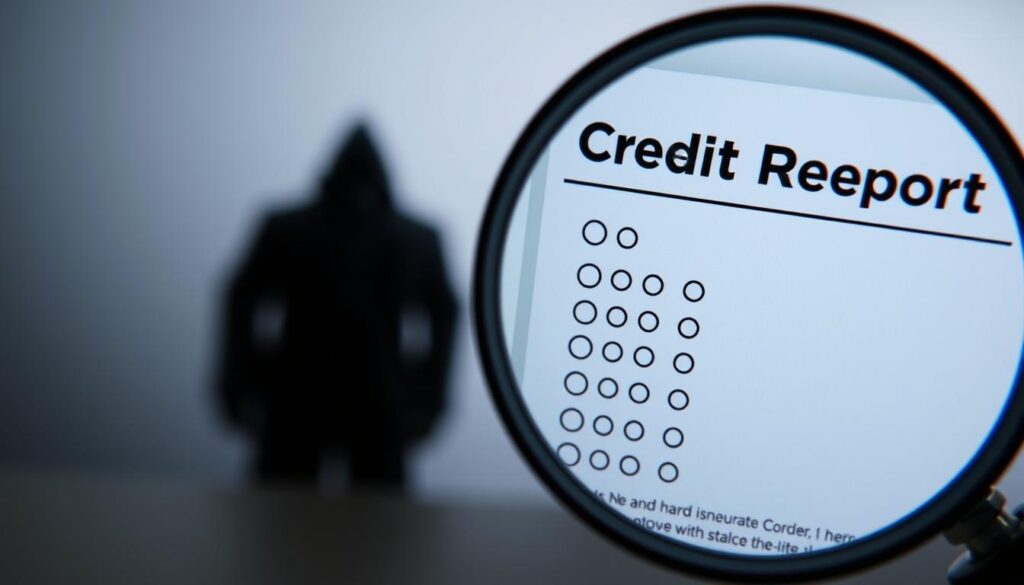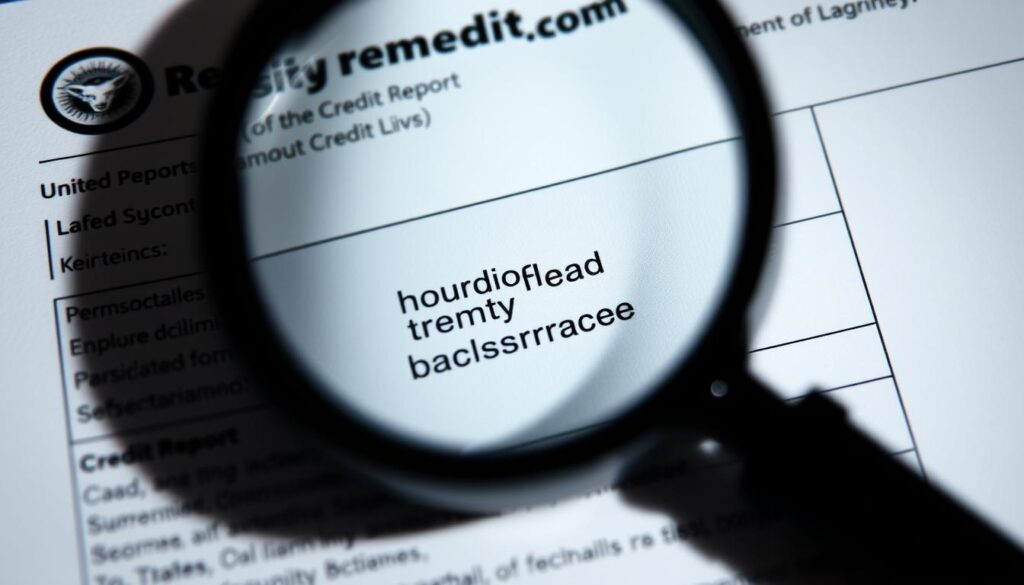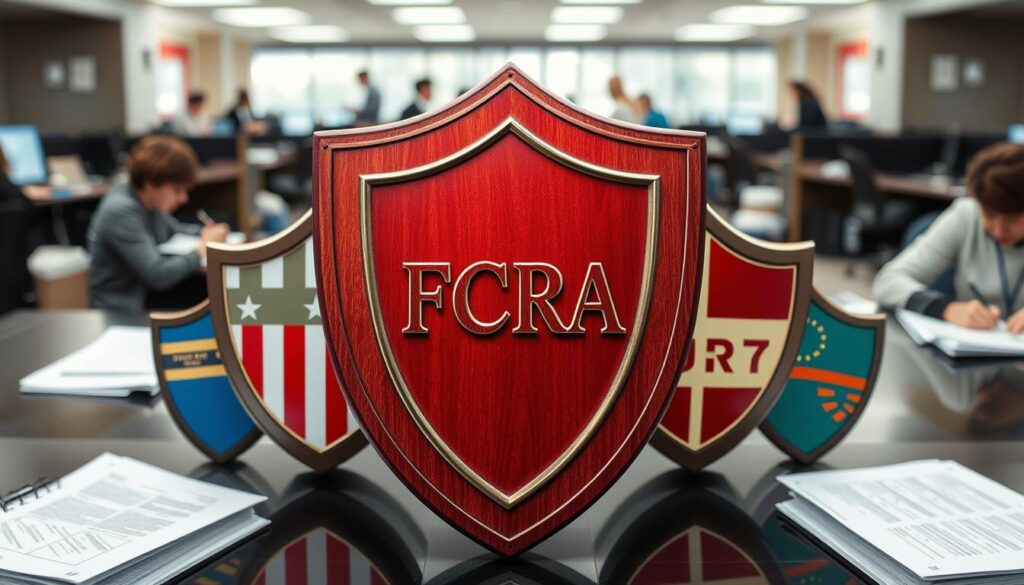Your credit score greatly affects your financial health. Hard inquiries can lower your score, but you can address them. Learn to spot unauthorized inquiries and protect your credit.
Credit bureaus track who checks your credit. Some checks, like those from potential lenders, can reduce your score. Watch your credit report for suspicious inquiries.
The Fair Credit Reporting Act gives you rights. You can know about these checks and dispute any errors.
Monitor your credit report regularly. This helps you catch and fix problems quickly. Learn secret ways to remove hard inquiries and maintain a healthy credit score.
Key Takeaways
- Hard inquiries can impact your credit score for up to two years
- Unauthorized inquiries can be disputed with credit bureaus
- The FCRA requires credit bureaus to inform you of hard inquiries
- Regular credit report checks help spot issues quickly
- Removing unauthorized inquiries can help protect your credit score
Understanding Hard Inquiries and Their Impact
Lenders check your credit history when you apply for credit. This process can affect your credit score differently. Let’s explore hard inquiries and their impact on your finances.
What is a hard inquiry?
A hard inquiry happens when a lender reviews your credit report. This occurs when you apply for a loan, credit card, or mortgage. Each hard inquiry can slightly lower your FICO score.
How do hard inquiries affect your credit score?
Hard inquiries typically cause a small dip in your credit score. The impact is usually minor, often less than five points. Multiple inquiries in a short time can have a bigger effect.
Lenders may see numerous credit applications as a sign of financial trouble.
The difference between hard and soft inquiries
Not all credit checks are equal. Soft pulls don’t affect your credit score. These happen when you check your own credit or get pre-approved offers.
Hard inquiries, however, can impact your score. They’re part of the credit application process.
| Hard Inquiry | Soft Inquiry |
|---|---|
| Affects credit score | No impact on credit score |
| Requires your permission | Can be done without your knowledge |
| Part of credit application process | Often for promotional purposes |
| Visible to other lenders | Only visible to you |
Knowing the difference between hard and soft inquiries helps manage your credit better. Limiting hard inquiries can maintain a healthier credit score. This improves your chances of approval for future credit applications.
The Importance of Monitoring Your Credit Reports

Monitoring your credit reports is vital for your financial health. Regular checks help spot unauthorized inquiries and potential identity theft early. This vigilance protects your credit score and financial future.
You can get free credit reports annually from Experian, Equifax, and TransUnion. These reports are available through AnnualCreditReport.com, a government-authorized website.
Credit monitoring services offer extra protection. They alert you to changes in your credit file. Many banks and credit card companies now offer free credit monitoring to customers.
- Check your credit reports regularly
- Get your free annual credit report from each bureau
- Consider using a credit monitoring service for added protection
Making credit monitoring a habit helps you catch issues quickly. This proactive approach maintains a healthy credit score. It also protects you from potential financial fraud.
“Your credit report is a snapshot of your financial life. Regular monitoring is like giving it a health check-up.”
Your credit report affects many parts of your life. It impacts loan approvals and rental applications. Taking control of your credit through monitoring is a smart move.
Regular credit monitoring can save you time, money, and stress. It’s a simple step that can have big benefits for your financial future.
Identifying Unauthorized Hard Inquiries
Regular credit report checks can catch and address errors early. This is crucial for preventing credit fraud and identity theft. Spotting unauthorized hard inquiries helps protect your financial health.
Common signs of fraudulent inquiries
Watch for inquiries from unfamiliar companies or those you haven’t applied with. Multiple inquiries in a short time could indicate identity theft.
Be wary of inquiries from different states or countries where you haven’t done business. These are potential red flags for fraudulent activity.

How to spot mistakes on your credit report
Review the “Hard Inquiries” section of your credit reports carefully. Compare entries across different credit bureaus for consistency.
Some legitimate inquiries may appear under unfamiliar names, like financial services companies. Create a timeline of your credit applications to compare against reported inquiries.
| Warning Signs | Action Steps |
|---|---|
| Unfamiliar company names | Research the company online |
| Inquiries from distant locations | Contact the credit bureau immediately |
| Multiple inquiries in short time | Place a fraud alert on your credit file |
| Inquiries for accounts you didn’t open | File a police report for identity theft |
Stay alert and act fast if you notice any suspicious activity. Quick action on unauthorized inquiries protects your credit score. It also safeguards your overall financial well-being.
The Legal Framework: Fair Credit Reporting Act (FCRA)
The Fair Credit Reporting Act (FCRA) protects consumer rights in credit reporting. It sets rules for credit bureaus and safeguards your financial information.

FCRA requires credit bureaus to investigate disputes within 30 to 45 days. They must thoroughly examine any questioned information during this time.
You can challenge incorrect data on your credit report. This right is crucial for maintaining accurate financial records.
“The FCRA gives consumers the power to take control of their credit reports and ensure their accuracy.”
Credit bureaus must fix or remove wrong information after an investigation. This rule keeps credit reports reliable and shields you from unfair practices.
| FCRA Provision | Consumer Benefit |
|---|---|
| Dispute Investigation Timeframe | Timely resolution of credit report issues |
| Right to Dispute | Ability to challenge inaccurate information |
| Mandatory Correction | Ensures credit report accuracy |
Knowing these rules helps you protect your financial health. You can better manage your credit profile by understanding your FCRA rights.
Stay informed and address any credit report issues promptly. This way, you’ll maintain a strong financial standing.
Secret Ways to Remove Hard Inquiries
Hard inquiries can impact your credit score. Some are legitimate, while others may be unauthorized or incorrect. Let’s explore strategies to address these issues and boost your credit score.

Disputing Inaccurate Inquiries
Start by checking your credit reports for errors. If you find any, file a dispute with the credit bureau. You can do this online, by mail, or phone.
Provide clear evidence to support your claim. Credit bureaus must investigate and respond within 30 days.
Negotiating with Creditors
For authorized inquiries, try contacting the creditor directly. Explain your situation and ask them to remove the inquiry. Some creditors may help, especially if you have a good history with them.
Utilizing Goodwill Letters
A goodwill letter asks a creditor to remove a negative item from your credit report. This can work well for inquiries from identity theft or fraud.
When writing your letter:
- Explain your situation clearly
- Acknowledge any mistakes on your part
- Highlight your positive history with the creditor
- Politely request the removal of the inquiry
Keep detailed records of all communications during the dispute process. Persistence and patience are crucial in credit repair efforts.
By using these strategies, you can work to remove unnecessary hard inquiries. This can help improve your overall credit score.
Step-by-Step Guide to Disputing Hard Inquiries
Tackling credit report corrections can be overwhelming. But don’t worry! We’ve got a clear plan to help you dispute hard inquiries. This guide will show you how to improve your credit score effectively.
Start by carefully reviewing your credit reports. Look for any unfamiliar or unauthorized hard inquiries. Once you spot them, it’s time to take action.
- Contact the company that made the inquiry
- Prepare a dispute letter template
- Submit your dispute to credit bureaus
- Wait for the investigation results
- Follow up if necessary
Your dispute letter should include your personal details and the inquiry in question. Add any supporting evidence you have. Keep your explanation clear and to the point.
| Credit Bureau | Online Dispute | Mail Address |
|---|---|---|
| Equifax | www.equifax.com/disputeonline | P.O. Box 740256, Atlanta, GA 30374 |
| Experian | www.experian.com/disputes | P.O. Box 9701, Allen, TX 75013 |
| TransUnion | www.transunion.com/disputeonline | P.O. Box 2000, Chester, PA 19016 |
Stay patient during this process. Credit bureaus have 30 days to look into your claim. If they reject your dispute, don’t lose hope.
You can seek help from a credit counseling agency. Another option is adding a statement to your credit report explaining the inquiry.
Dealing with Identity Theft-Related Inquiries
Identity theft can ruin your credit report. Spotting the signs early is key to protecting yourself. Let’s look at how to detect identity theft and what to do if it happens.
Recognizing Signs of Identity Theft
Stay alert for these warning signs:
- Unexpected changes in your credit score
- Unfamiliar accounts on your credit report
- Unexplained charges on your bank statements
- Bills for services you didn’t use
- Calls from debt collectors about unknown debts
Steps to Take if You’re a Victim
If you think you’re a victim, act quickly:
- Place a fraud alert on your credit reports
- File a report with the Federal Trade Commission
- Contact your local police department
- Consider a credit freeze for extra protection
- Reach out to creditors to close fraudulent accounts
- Keep monitoring your credit reports for suspicious activity
A credit freeze locks your credit file. This makes it harder for scammers to open new accounts in your name.
Quick action and ongoing vigilance are vital. They help protect your financial identity from thieves.
| Protection Measure | Duration | Cost |
|---|---|---|
| Fraud Alert | 1 year (initial) | Free |
| Credit Freeze | Until you lift it | Free |
| Credit Monitoring | Ongoing | Varies (some free options) |
Preventing Unnecessary Hard Inquiries
Limit new credit applications to manage your credit wisely. Hard inquiries appear on your report when you apply for credit. Create a solid strategy and only apply when truly necessary.
Use prequalification offers with soft inquiries when shopping for rates. These don’t affect your credit score. Try to do rate shopping for big purchases within a short timeframe.
Credit bureaus often treat multiple inquiries as one if they occur within 14 to 45 days. This applies to auto loans or mortgages.
Be careful when sharing personal information for credit checks. Always verify the legitimacy of credit applications before proceeding. This approach protects your credit score from unnecessary hard inquiries.
FAQ
What is a hard inquiry?
How do hard inquiries affect your credit score?
What’s the difference between hard and soft inquiries?
Why is it important to monitor my credit reports?
How can I spot unauthorized hard inquiries on my credit report?
What are my rights under the Fair Credit Reporting Act (FCRA)?
How do I dispute inaccurate hard inquiries?
What steps should I take if I’m a victim of identity theft?
How can I prevent unnecessary hard inquiries?
Source Links
- How to Remove Hard Inquiries From Your Credit Report – https://www.experian.com/blogs/ask-experian/how-to-remove-hard-inquiries-from-credit-report/
- How to Remove Hard Inquiries from Credit Reports | Credit.com – https://www.credit.com/blog/how-to-remove-hard-inquiries/
- Can you remove hard inquiries from your credit reports? – https://www.creditkarma.com/advice/i/how-to-remove-hard-inquiries

